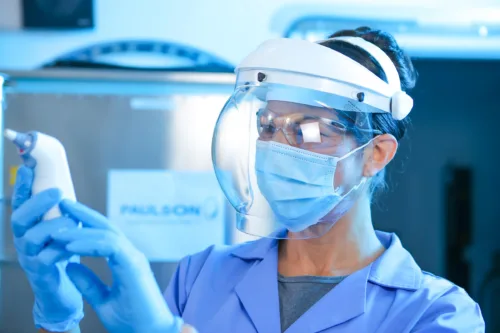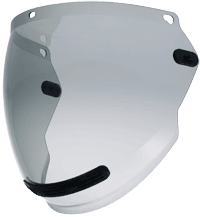In the world of industrial safety, face and eye protection are critical. When it comes to selecting the right face shield or goggles, the performance of the transparent plastic material needs to be taken into consideration. Factors such as resistance to high (or low) temperature, impact, and chemical splash hazards are all important considerations. When manufacturing our world-class face shields and goggles, Paulson uses three primary transparent plastic materials – polycarbonate, nylon, and Tritan. In this post, we’ll delve into the features and benefits of each to help you make informed choices in safeguarding yourself against workplace hazards.
Polycarbonate
Polycarbonate reigns supreme in industrial settings due to its exceptional impact resistance. This thermoplastic polymer boasts high strength and durability, making it an ideal choice for environments where projectiles and flying debris pose significant risks. Its ability to withstand high impact forces ensures maximum protection for your face and eyes against mechanical hazards.
Polycarbonate also exhibits remarkable heat resistance, making it suitable for applications involving elevated temperatures. Whether you’re working in foundries or welding environments, polycarbonate face shields offer reliable protection against radiant heat and sparks, safeguarding your vision and facial integrity. In addition to high heat, polycarbonate performs excellent in low temperature conditions, making it ideal for applications such as cryogenic work and food processing.
However, while polycarbonate excels in impact and temperature resistance, it may not be the best choice for handling certain chemicals. Prolonged exposure to harsh chemicals can cause degradation and compromise its structural integrity, potentially compromising safety in chemical-intensive work environments.
Most of the transparent PPE that Paulson manufactures is made of a polycarbonate base material. This includes arc flash, heat reflective, high temp & impact, and shaded welding face shields & goggles for industrial workers; riot control face shields and handheld body shields for law enforcement & military; and structural & wildland goggles for firefighters.
Nylon
Nylon, a versatile thermoplastic known for its strength and flexibility, presents unique advantages in certain industrial settings. Nylon offers superior chemical resistance compared to polycarbonate, making it an excellent choice for protection against corrosive substances and chemical splashes.
Nylon also exhibits good thermal stability, allowing it to withstand high temperatures without deformation or degradation. This makes nylon face shields suitable for environments where both chemical exposure and high heat are prevalent, such as laboratories, chemical processing plants, and pulp & paper mills.
Paulson’s transparent nylon face shield is an excellent option for workers in environments where extreme heat (500-600° Fahrenheit) and chemical hazards are present, such as pulp & paper mills.
Tritan
Tritan, a relatively newer player in the transparent plastic arena, combines the benefits of both polycarbonate and nylon while offering unique properties of its own. With excellent impact resistance comparable to polycarbonate and enhanced chemical resistance akin to nylon, Tritan presents a compelling option for versatile face and eye protection in industrial settings. Tritan’s resistance to a broad range of chemicals, including acids, bases, and hydrocarbons, makes it an excellent choice for chemical splash protection.
Additionally, Tritan exhibits exceptional clarity and optical quality, ensuring clear vision without distortion or haze. This feature is particularly advantageous in tasks requiring precise vision, such as machining and assembly operations.
However, it’s essential to note that Tritan may have limitations in extreme conditions, such as ultra-high temperatures or prolonged exposure to highly corrosive chemicals. Therefore, while it offers a balanced combination of properties, evaluating its suitability based on your specific workplace hazards is crucial.
Made with a Tritan base material, Paulson’s line of chemical splash face shields & goggles perform excellent against a wide range of chemicals.
In the process of choosing between polycarbonate, nylon, and Tritan for industrial face and eye protection, it’s important that a thorough assessment of the predominant hazards in your workplace be conducted. Polycarbonate excels in impact and high/low temperature resistance, nylon offers superior heat and chemical resistance, and Tritan provides a balanced blend of both while ensuring optical clarity. By understanding the distinct features and benefits of these materials, you can make informed decisions to enhance safety and protect against potential hazards in your work environment.
For more information on the different types of plastic materials we use and their specific features and benefits, please contact us today.




